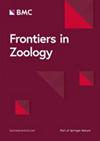天气条件对鸟类繁殖性能的影响:来自长期研究的见解
IF 2.6
2区 生物学
Q1 ZOOLOGY
引用次数: 0
摘要
了解早期发育期间的天气条件如何影响繁殖成功,对于预测鸟类对气候变化的反应至关重要。我们使用了一个40年的有领捕蝇(Ficedula albicollis)巢箱种群的数据集,研究了孵化和筑巢期间的温度和降水如何影响繁殖性能的三个关键组成部分:孵化数量、羽翼产量和当地后代招募。我们发现,在筑巢期间较高的环境温度与孵化失败的可能性降低和更多的新兵有关。相反,在雏鸟阶段,较高的降水总和与孵蛋失败的可能性增加有关。有趣的是,孵化期间的天气条件对繁殖性能没有统计上可检测的影响。此外,我们的研究结果表明,气候条件的季节内变化,而不是季节之间的变化,主要与生殖结果相关。这些发现强调了在评估繁殖成功率和预测气候变化的生态后果时,考虑跨季节的总体气候条件和繁殖季节内的短期天气参数的重要性。本文章由计算机程序翻译,如有差异,请以英文原文为准。
The impact of weather conditions on avian breeding performance: insights from a long-term study
Understanding how weather conditions during early development influence reproductive success is essential for predicting avian responses to climate change. We used a 40-year dataset from a nest-box population of collared flycatchers (Ficedula albicollis) to examine how temperature and precipitation during the incubation and nestling periods affected three key components of reproductive performance: hatchling number, fledgling production, and local offspring recruitment. We found that higher ambient temperatures during the nestling period were associated with a decreased probability of brood failure and a higher number of recruits. In contrast, a higher sum of precipitation during the nestling stage was associated with an increased likelihood of brood failure. Interestingly, weather conditions during incubation had no statistically detectable influence on reproductive performance. Moreover, our results indicated that the within-season variation in climatic conditions, rather than the between-season variation, was primarily associated with reproductive outcomes. These findings underscore the importance of considering both overall climate conditions across seasons and short-term weather parameters within breeding seasons when evaluating reproductive success and predicting the ecological consequences of climate change.
求助全文
通过发布文献求助,成功后即可免费获取论文全文。
去求助
来源期刊

Frontiers in Zoology
ZOOLOGY-
CiteScore
4.90
自引率
0.00%
发文量
29
审稿时长
>12 weeks
期刊介绍:
Frontiers in Zoology is an open access, peer-reviewed online journal publishing high quality research articles and reviews on all aspects of animal life.
As a biological discipline, zoology has one of the longest histories. Today it occasionally appears as though, due to the rapid expansion of life sciences, zoology has been replaced by more or less independent sub-disciplines amongst which exchange is often sparse. However, the recent advance of molecular methodology into "classical" fields of biology, and the development of theories that can explain phenomena on different levels of organisation, has led to a re-integration of zoological disciplines promoting a broader than usual approach to zoological questions. Zoology has re-emerged as an integrative discipline encompassing the most diverse aspects of animal life, from the level of the gene to the level of the ecosystem.
Frontiers in Zoology is the first open access journal focusing on zoology as a whole. It aims to represent and re-unite the various disciplines that look at animal life from different perspectives and at providing the basis for a comprehensive understanding of zoological phenomena on all levels of analysis. Frontiers in Zoology provides a unique opportunity to publish high quality research and reviews on zoological issues that will be internationally accessible to any reader at no cost.
The journal was initiated and is supported by the Deutsche Zoologische Gesellschaft, one of the largest national zoological societies with more than a century-long tradition in promoting high-level zoological research.
 求助内容:
求助内容: 应助结果提醒方式:
应助结果提醒方式:


